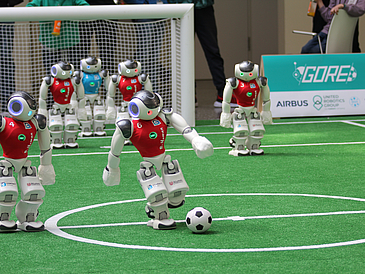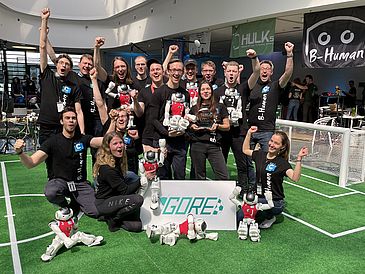For the second time in a row, the Standard Platform Liga teams met in Hamburg at the German Open Replacement Event (GORE), one of five decentrally organized RoboCup German Open 2023 events. This time it was held at the Center for Free-Electron Laser Science (CFEL).
With 67:0 goals in eight games, the team from Bremen dominated the tournament. During the group stage, B-Human managed to score an impressive 40 goals, including two 10-0 victories against the Dutch Nao Team and the Bembelbots from Frankfurt. With a lead of 10 goals, the so-called "mercy rule" takes effect and the game is ended early. This is particularly difficult to achieve in the group stage, as there is no added time and the time the robots have to get back into position for kick-off after a goal is scored is deducted from the effective playing time. Instead of the regular 2 x 10 minutes, only around 12 minutes are actually played when there are so many goals.
This difference became apparent in the finals, where the full 20 minutes are played, as the quarterfinal against Team Naova from Canada was ended early in the first half with a score of 10-0, and the semifinal was ended early in the second half after a halftime score of 8-0 against the Nao Devils from Dortmund. In the final, B-Human once again faced HTWK Robots from Leipzig, as they have in all competitions since RoboCup 2018. The Bremen team was able to win many one-on-one tackles and outplay the Leipzig robots with passes, making the score of 7:0 a little clearer this time than in the previous year.
Nine teams from Germany, the Netherlands, Switzerland, and Canada took part in GORE 2023, which was organized as an official RoboCup event. The rules by which the robots play at RoboCup become more challenging every year. The big change this year is the increase in team size from five players to seven. This requires more complex tactics from the teams in order to be able to use the two additional players to their advantage.
Team B-Human, with its heavily pass-based style of play, was able to benefit significantly from the increase in players, as more potential passing partners were always available. However, the additional players also posed another challenge, as the budget introduced the previous year for players to communicate with each other remained unchanged. During a match, all of a team's robots are still only allowed to send a total of 1,200 messages via Wi-Fi to their teammates; such messages typically contain information about their own position or that of the ball. This means that this year seven players now have to make do with the number of messages that were available to only five players last year, making coordination within the team more demanding.
In addition, it is also a challenge to even put seven functioning robots on the field. This is where the Bremen team's research into stable walking and smooth falling pays off, making the robots less likely to "get hurt." Similarly, recent research work is helping to ensure that even older robots, whose joints are sometimes badly worn, can continue to walk stably and swiftly.
Currently, B-Human is made up of twelve students from the University of Bremen, a former student who dedicates his free time to the team, and the supervising researchers Dr. Thomas Röfer from the German Research Center for Artificial Intelligence's (DFKI) Cyber-Physical Systems research group, which is headed by Prof. Dr. Rolf Drechsler, and Dr. Tim Laue and Arne Hasselbring from Prof. Dr. Udo Frese's working group at the University of Bremen. The company CONTACT Software, the leading provider of solutions for product processes and the digital transformation, has been the main B-Human sponsor since 2017.


